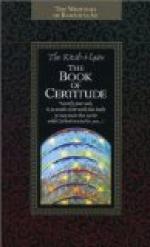Consider how with this one verse which hath descended from the heaven of the Will of God, the world and all that is therein have been brought to a reckoning with Him. Whosoever acknowledged His truth and turned unto Him, his good works outweighed his misdeeds, and all his sins were remitted and forgiven. Thereby is the truth of these words concerning Him made manifest: “Swift is He in reckoning.” Thus God turneth iniquity into righteousness, were ye to explore the realms of divine knowledge, and fathom the mysteries of His wisdom. In like manner, whosoever partook of the cup of love, obtained his portion of the ocean of eternal grace and of the showers of everlasting mercy, and entered into the life of faith—the heavenly and everlasting life. But he that turned away from that cup was condemned to eternal death. By the terms “life” and “death,” spoken of in the scriptures, is intended the life of faith and the death of unbelief. The generality of the people, owing to their failure to grasp the meaning of these words, rejected and despised the person of the Manifestation, deprived themselves of the light of His divine guidance, and refused to follow the example of that immortal Beauty.
When the light of Qur’anic Revelation was kindled within the chamber of Muhammad’s holy heart, He passed upon the people the verdict of the Last Day, the verdict of resurrection, of judgment, of life, and of death. Thereupon the standards of revolt were hoisted, and the doors of derision opened. Thus hath He, the Spirit of God, recorded, as spoken by the infidels: “And if thou shouldst say, ’After death ye shall surely be raised again,’ the infidels will certainly exclaim, ’This is nothing but manifest sorcery.’"(81) Again He speaketh: “If ever thou dost marvel, marvellous surely is their saying, ’What! When we have become dust, shall we be restored in a new creation?’"(82) Thus, in another passage, He wrathfully exclaimeth: “Are We wearied out with the first creation? Yet are they in doubt with regard to a new creation!"(83)
As the commentators of the Qur’an and they that follow the letter thereof misapprehended the inner meaning of the words of God and failed to grasp their essential purpose, they sought to demonstrate that, according to the rules of grammar, whenever the term “idha” (meaning “if” or “when”) precedeth the past tense, it invariably hath reference to the future. Later, they were sore perplexed in attempting to explain those verses of the Book wherein that term did not actually occur. Even as He hath revealed: “And there was a blast on the trumpet,—lo! it is the threatened Day! And every soul is summoned to a reckoning,—with him an impeller and a witness."(84) In explaining this and similar verses, they have in some cases argued that the term “idha” is implied. In other instances, they have idly contended that whereas the Day of Judgment is inevitable, it hath therefore been referred to as an event not of the future but




